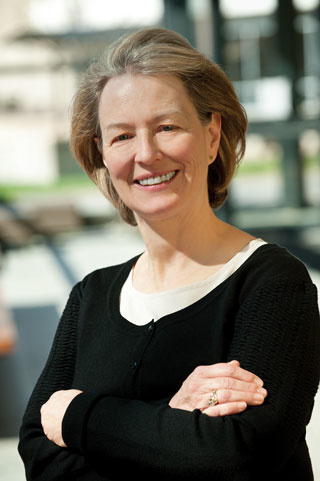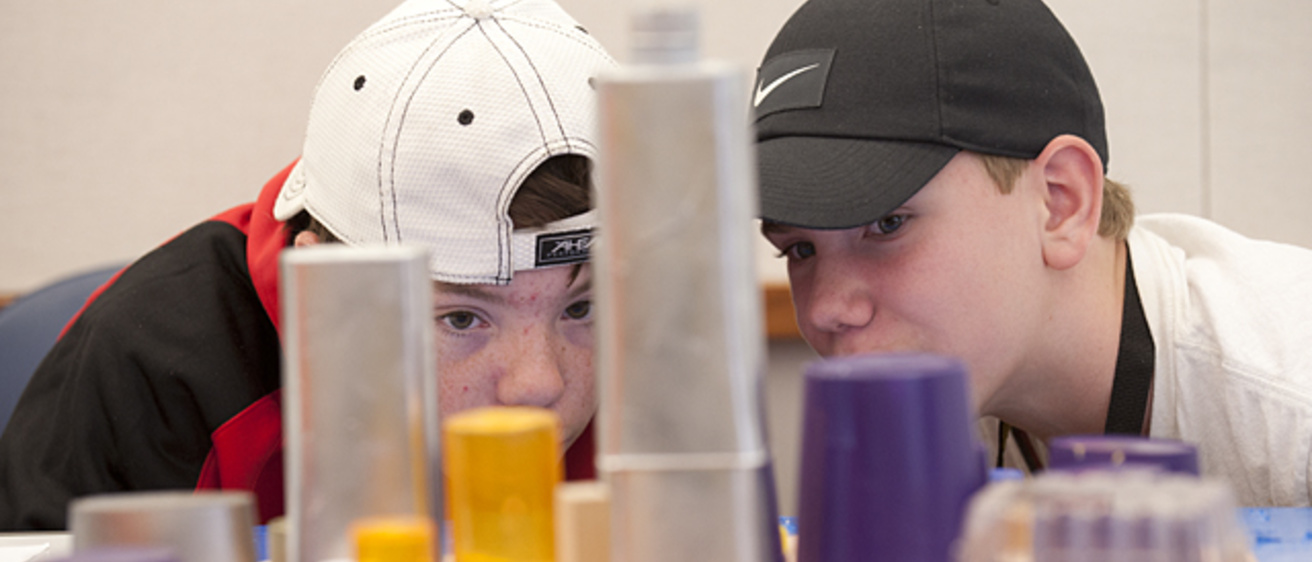In the 1960s, few schools in the country had gifted education programs, including schools in Sioux City, where Susan Assouline grew up.
But Assouline was a strong reader. So good that she qualified to take a foreign language course in seventh grade, a course normally not offered until high school.
On the day her teacher announced to the class the names of students selected for this opportunity, Assouline's name wasn't mentioned, and she went home feeling down. Her mother called the school and found out it was just a clerical error.

It was the first time, Assouline says, that she recognized the tension many gifted students face: the desire to be recognized and to be given greater challenges, and the stigma sometimes attached to students who are given “special” opportunities.
“It was kind of this conflict because I felt like I was betraying the other kids, but I was really happy to be identified through being a good reader as someone who was ready to take French,” Assouline says, "and I was excited to try something new."
More than five decades later, Assouline is now at the helm of the University of Iowa's Belin-Blank Center for Gifted Education and Talent Development, directing the internationally renowned center as it celebrates its 25th anniversary this July.
The Belin-Blank Center will celebrate its 25th anniversary Wednesday, July 10, with an open house from 3 to 4:30 p.m. in the lobby of the Blank Honors Center. For more information, visit now.uiowa.edu/2013/06/belin-blank-center-celebrates-25-years-open-house-july-10.
One of the center’s key missions is to provide differentiated educational opportunities to students in much the way that Assouline was given the opportunity to pursue French in junior high.
“I look back on my story when I talk to parents about advocating for their kids and I always say to parents, ‘If you don’t advocate for your kids, who will?’” she says.
In the 1970s and 1980s, Assouline taught physical science education in Iowa City at Northwest Junior High School and West High School. She later worked as a school psychologist at Grant Wood Area Education Agency before joining the Belin-Blank Center in its early years, when gifted education was still a new concept.
Although Assouline's research interests are in the development of talent in the domains of math and science, she says that learning French at a young age had a clear benefit. Being fluent in French, she worked as a bilingual office worker overseas after graduating from college.
“I’m really glad to know French because I met my husband, who is a native French speaker,” Assouline says, adding that they met while she was studying in Israel at a kibbutz because of her interest in educational psychology and child development.
Drawn to UI due to health care
Just as hundreds of youth come to the UI campus as part of Belin-Blank Center workshops, institutes, and other programs, Assouline recalls a turning point for her when first visiting the UI campus.
“I was motivated to attend the University of Iowa because I had heard about the hospital,” Assouline says. “I had a friend whose father was really ill and had been involved with the hospital, and my mom was a nurse, and so I was kind of thinking about nursing and medicine, but I wasn’t really sure what I was going to do.”
She loved the campus and got a scholarship.
“Very serendipitously, I saw a sign that you could apply for a summer stipend, which was an NSF (National Science Foundation) grant, where they brought together science teachers and students who were interested in science, and they spent a summer learning about curriculum and teaching,” Assouline says, “and I thought, ‘Wow. I could see myself doing this.’”
It was a turning point for Assouline, who had been interested in medicine but didn’t like dealing with illness.
She also participated in The Cooperative Urban Teacher Education Program (CUTE) her senior year at UI, which further cemented her interest in education.
“I did my student teaching in inner city Kansas City,” Assouline says. “That was a real pivotal experience because I loved working in the inner city at the junior high level.”
Assouline says she resonates with junior high students “because they are vulnerable, curious, and kind of unabashedly excited about learning and trying out new things.”
She still gets that same feeling of excitement as she welcomes hundreds of youth and their families for academic and creative camps and other special summer programs at the Belin-Blank Center, where the students do everything from creating stop motion animation to planning future cities.
Programs such as the Junior Scholars Institute and the Blank Summer Institute annually draw hundreds of exceptionally talented students, providing them with an intensive and advanced educational experience designed to enhance their intellectual and social growth.
Drawn into gifted ed through special ed
Rather than one moment in time when Assouline knew she wanted to specialize in gifted education, she explains, “I really have a profound quest to learn more about individual differences because of my interest in special education.”
In fact, while in Iowa City, she began taking additional special education classes to gain a better understanding of individual differences in learning.
“A lot of people of my generation started out in a different field, many of us in special ed,” Assouline says.
When Assouline’s husband had a post-doctoral position in Bethesda, Md., at the National Institutes of Health, she made a cold call to a famous but humble educational expert at Johns Hopkins, Julian Stanley. To her delight, she landed a post-doctoral position with the landmark Study of Mathematically Precocious Youth.
Girls don’t need calculus
Looking back, Assouline sees the irony in an experience she had in high school. When she was interested in registering for a calculus class in high school, she recalls a high school counselor telling her she didn’t need to take calculus because she was a girl, a statement Assouline finds both shocking and sad in retrospect.
“That’s one of the reasons that we really advocate for Advanced Placement courses in high schools because there are kids who are ready for those experiences,” Assouline says. “You get a college experience in high school, and it’s well documented that people who have opportunities for Advanced Placement have a better chance of being successful in college.”
Center impacts state, nation, and world
In fact, thanks to the Belin-Blank Center’s AP Online Academy, Iowa went from 47th in the nation in 1991 in the number of high school students taking AP classes to 26th in the nation in 2010 by offering AP courses online to schools in both smaller rural communities and larger metro schools.
Assouline says she’s also gratified to see the center’s impact in Iowa’s capitol where the Des Moines Central Academy, created in 1985, was a leader in offering AP classes and advanced programming, and they remain in a class of their own.
Colangelo developed a teacher training fellowship program for 17 teachers in Des Moines before the center was a concept. Everything related to the program fit into a Xerox box.
“And so I would say the fellowship program made some of that impact,” Assouline says. “If you didn’t have a cadre of leaders, they wouldn’t be able to advocate and push for that at the academy.”
She was there at the time as a graduate student to Colangelo working with the program in the beginning stages with the teachers fellowship program. (See related story at now.uiowa.edu/2012/12/entrepreneurial-educator.
"In the mid to late 80s is when we started to bring teachers from all over the state of Iowa and so it was always fun when we had the teachers from Sioux City because they were from my hometown so that was really special," Assouline says.
The impact of training so many teachers in the Des Moines metro area resulted in more advocacy and action in that area.
"I’m humbled by the power that we have to really impact students’ lives in such positive and profound ways."
—Susan Assouline, Belin-Blank Center director
Other center highlights over the past 25 years include the creation of the Wallace National Research Symposium on Talent Development, which is the premier gifted education conference in the world, drawing scholars from more than 50 countries on a biannual basis.
One of the most substantial contributions, Assouline says, was the publishing of A Nation Deceived: How Schools Hold Back America’s Brightest Students in 2004, which Assouline co-published with Colangelo and Miraca U.M. Gross.
“Over the years with the research symposium, we started to realize that we had a unique niche in terms of thinking about the development of talent and development of expertise, and the role that academic acceleration played in that,” Assouline says. “I took a leadership role in developing a system for making the decision about academic whole grade acceleration.”
Another important area where the center has made an impact is with twice exceptional students, or those who are both gifted and have learning, behavioral, or social impairments. (see related story at spectator.uiowa.edu/2010/august/twice_exceptional.html.)
Serendipitous learning odyssey
Assouline says when she reflects on her own learning odyssey and career, she recognizes that much of it was "serendipitous but also being in the right place at the right time and saying yes."
“It feels really special to be part of Iowa where we have this very unique organization, and to have the support that we have, is both awesome and unbelievable,” she says.
She says that even after working with the center for almost two and one-half decades, she remains energized by the students, parents, and her amazing team of colleagues.
“Because of my parents advocating for me, I had all of these experiences, and I think about some of the simple decisions that made such a difference in terms of the path that I took,” Assouline says. “I’m humbled by the power that we have to really impact students’ lives in such positive and profound ways.”
While many of her opportunities came about by chance, she says she and her colleagues want to make opportunities for students today much more systematic and accessible.
“That’s what Belin-Blank is all about—giving opportunities to people,” Assouline says, “because we know it makes a difference.”
